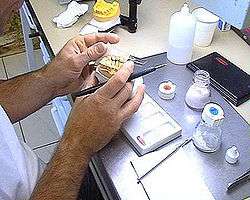Dental technician

A dental technologist (dental laboratory technician) is a member of the dental team who, upon prescription from a dental clinician, constructs custom made restorative and dental appliances.[1][2]
There are four major disciplines within dental technology. These are fixed prosthesis including crowns, bridges and implants; removable prosthesis, including dentures and removable partial dentures; maxillofacial prosthesis, including ocular prosthesis and craniofacial prosthesis; and orthodontics and auxiliaries, including orthodontic appliances and mouthguards.[3]
The dentist communicates with the dental technologist with prescriptions, drawings and measurements taken from the patient. The most important aspect of this is a dental impression into which the technologist flows a gypsum dental stone to create a replica of the patients anatomy known as a dental cast. A technologist can then use this cast for the construction of custom appliances.[4][5]
Fixed Restorations
A fixed dental restoration is an appliance designed to replace a tooth or teeth that may have been lost or damaged by injury, caries or other oral diseases. These restorations are distinguished from other restorations by the fact that once they have been placed by a dentist the patient can not remove them.[6] Such Restorations include; crowns, bridges, veneers, fixed implant restorations, inlays and onlays.[7][8]
Removable Restorations
Removable restorations are dental appliances to replace one or more teeth that have been completely lost. These restorations ideally remain stable in normal function but can be removed by the patient for cleaning and at night. Removable restorations are either retained by the patients soft tissue as in full dentures,[9] supported by other teeth as with partial dentures and overdentures[10] or on implant attachments as with implant retained overdentures and partial dentures.[11]
Maxillofacial Technology
Maxillofacial Prosthetist Technologists (MPT) In the UK we are referred to as Maxillofacial Prosthetists. In other countries they also use terms such as Anaplastologist (USA and Europe) and Epithetist (Europe).The field of Maxillofacial Prosthetics in the UK provides a wide variety of prostheses and medical devices. A list of some of the work undertaken includes: Prostheses Facial and Body prostheses, Eye prostheses Breast and nipple prostheses, Customy made body implants, Titanium skull implants, Eyelid weights, Other Non Prosthetic clinical procedures include Micro-pigmentation (medical tattooing) Skin camouflage. Custom made splinting devices; Burns splints, Keloid scar splints, Surgical planning for Jaw surgery (Osteotomy) and Facial or Craniofacial surgical planning. Cleft lip and palate Medical Modelling Surgical Simulation modelling, Surgical appliances to help after trauma. Custom made medical device manufacture, TMJ appliances, Tracheal oesophageal valve modifications, Sleep apnoea devices, Oral obturators (specialist dentures) Nasal septum obturators, Intra-oral prosthetics. Maxillofacial Prosthetists not only work closely with Oral and Maxillofacial surgeons but also treat patients independently in their own clinics. They are registered with the GDC and are able to provide a wide variety of custom made devices. MPT's in the UK are also registered with the Institute of Maxillofacial Protosthists Technologists (IMPT).
Orthodontics
Orthodontic technologist make removable orthodontic appliances with wires, springs and screws on prescription from and Orthodontist to either move teeth to form a more harmonious occlusion and aesthetic appearance of teeth or to maintain the position of previously moved teeth.
See also
References
- ↑ Dental Council of New Zealand, Notice of Scopes of Practice and Prescribed Qualifications
- ↑ General Dental Council UK, Scopes of Practice
- ↑ Dental technician/dental technologist NHS Careers
- ↑ Fabricating Casts http://www.tpub.com/content/medical/14275/css/14275_203.htm
- ↑ Crown and Bridge Restorations, http://www.qualitydentistry.com/dental/restorative/candb.html
- ↑ The functional fixed http://www.scribd.com/doc/6630184/The-Functionally-Fixed-Restoration
- ↑ Zitzmann, Nicola Ursula; Hagmann, Edgar; Weiger, Roland (2007). "What is the prevalence of various types of prosthetic dental restorations in Europe?". Clinical Oral Implants Research. 18: 20–33. doi:10.1111/j.1600-0501.2007.01435.x. PMID 17594367.
- ↑ Types of Dental Restorations http://www.mercurypoisoned.com/different.html
- ↑ Jacobson, TE; Krol, AJ (1983). "A contemporary review of the factors involved in complete denture retention, stability, and support. Part I: retention". The Journal of prosthetic dentistry. 49 (1): 5–15. doi:10.1016/0022-3913(83)90228-7. PMID 6337253.
- ↑ Removable partial denture design protocol
- ↑ Nobel Biocare Full arch restorationhttp://www.nobelbiocare.com/en/products-solutions/solutions-for-all-indications/full-arch-restorations/